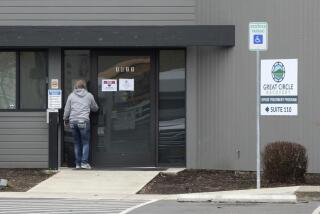Plan for Off-Reservation Casino Causes Stir in Oregon
- Share via
CASCADE LOCKS, Ore. — Not much goes on in this fading mill town in the Columbia River Gorge.
Asked to name the major industries here these days, Kelly Evans, the manager at River City Hardware, reflected a moment and answered: “Peace and quiet.”
Though it’s precisely that rustic charm that has spurred a fledgling tourist business here -- 40 miles or so east of Portland -- local, state and Indian leaders envision a much greater visitor lure on the horizon: a huge casino that they project could draw 3 million customers a year and reinvigorate the town’s ailing economy.
The proposed casino, strongly backed by Gov. Ted Kulongoski, a Democrat, would be the first in Oregon built on non-Indian land and among just a handful of off-reservation Indian-owned gambling centers in the country.
The agreement the governor reached last month with the prospective owner and operator, the Confederated Tribes of Warm Springs, has quickly become a major controversy in Oregon -- because of its precedent-setting potential as well as its proposed location in a town that calls itself the Heart of the Gorge.
Opponents say the idea is something close to blasphemy, because the Gorge, a spectacular ribbon of waterfalls, forested trails and stunning overlooks across the mighty Columbia, is a federally designated national scenic area, and it is intended to stay scenic.
But proponents, including the governor and tribal leaders, say a building can be designed in harmony with the view, and they point to a major benefit to the cash-strapped state government here: Under the agreement, 17% of casino profits would be turned over to the state for tuition and health programs. That could amount to $30 million or more annually.
At a signing ceremony here for the agreement last month, there were drums, tribal singing and an offering from the Cascade Locks School band, which played the overture from “The Lord of the Rings.” An array of dignitaries spoke in favor of the casino.
Kulongoski said the plan was “put together to protect the environment, to grow the future of Oregon, which is our children, and at the same time, look out for growing the economy and to improving the quality of life for the people of this community.”
The casino plan would have to clear some major hurdles before it could be constructed in an industrial-zoned area at the edge of town.
The U.S. Interior Department, one of the agencies involved in approving deals for off-reservation gambling, recently threw up a roadblock by saying it would not make a final decision on the casino compact until it had approved the terms of a trust for the land that would be used.
A spokeswoman for Kulongoski, Anna Richter Taylor, said the ruling involved “a procedural issue only,” and officials with the Warm Springs tribes say they are confident of gaining approval and opening the casino by Christmas 2007.
No way, say opponents, who have vowed to push for legislative hurdles in Congress and in the state Legislature. One of the most impassioned opponents is U.S. Rep. David Wu, an Oregon Democrat.
He said the Interior Department’s delay brought a welcome respite to the controversy and would “give Oregonians a chance to reconsider the kind of state we wish to be.”
In a recent U.S. House floor speech with overtones of 19th century populist William Jennings Bryan, Wu said of the idea for the Gorge: “We should not sacrifice our national treasures, our communities or our souls upon the altar of Indian casino gambling.”
The off-reservation casino would be a first for Oregon, but the debate over the idea also has national relevance. Indian tribes have several proposals pending in other states that would let them open casinos away from their traditional tribal lands and typically closer to major urban areas with bigger customer bases.
For instance, the Lytton Band of Pomo Indians is seeking to put land near San Pablo, in Northern California, in a special trust that would allow it to open a casino near Interstate 80.
Indian-owned casinos generated $18.5 billion in revenue in 2004, nearly twice the take of Nevada’s casinos, according to a report compiled last month by the National Indian Gaming Assn.
As in many of the disputes around the country over proposed locales, the fight in the Gorge pits complex arrays of allies against each other.
Among the opponents are environmental groups such as Friends of the Columbia River Gorge, which considers placing a casino in a designated scenic sanctuary outrageous. Other foes include competing tribes with casinos somewhat farther from Portland, antigambling Christian groups and the Oregon Restaurant Assn., which represents hundreds of retailers who generate revenue by selling Oregon lottery tickets.
“It’s a bad idea,” one advertisement funded by opponents says. “It will mean even more tribal casinos, off tribal lands -- and it’ll trash the Gorge.”
But proponents include various tribes and local merchants, especially hotels, restaurants and others catering to tourists, that could benefit from a surge of new visitors to Cascade Locks.
Gov. Kulongoski maintains that the deal is a good one for the state because it would close off a potential plan by the Warm Springs tribes to develop a casino on more environmentally sensitive land elsewhere in the Gorge, near the town of Hood River, about 20 miles farther east.
The tribe owns that land, he said, and could have pushed to build there with a plan that would not have the same tuition fund built into it.
More to Read
Sign up for The Wild
We’ll help you find the best places to hike, bike and run, as well as the perfect silent spots for meditation and yoga.
You may occasionally receive promotional content from the Los Angeles Times.






